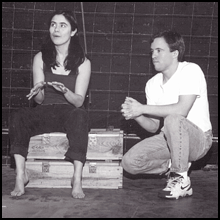![[Sidebar]](/standard/image/sidebar.gif)
![[Theater]](/standard/image/headers/theater_header.gif)
| hot links | listings | reviews |
Hit and run
Blink's latest diminutive dramas
by Bill Rodriguez
BLINK. Featuring Ruby, by Mauro Hantman, directed by Marilyn Dubois; Wherever You Go, There You Are, by Debbie Falb, directed by Ivy Brunelle; Fistfire and the Flying Buttress, by Jeffrey Baluch, directed by C.J. Racinski; At Bats, by Ross Berger, directed by Katie Byrnes; Maybe Baby, by Brandon Kornell, directed by Lizzie Araujo; and IDo, by Rick Massimo, directed by Russell Kellogg. At Perishable Theatre through February 22.
Rebecca Hart and Ron Haxton in 'Ruby'
Don't blink or you'll miss it. That style. "Ten-minute" plays -- which actually may run 20 or 30 minutes -- that offer up a little theatrical nugget rather than try for a gold mine. Perishable Theatre's fifth Annual Blink Play Festival is having a short run through February 22.The six playlettes open with a smart little treat called Ruby, written by Mauro Hantman and directed by Marilyn Dubois. The title character (Rebecca Hart) speaks in nonsense, at least to untrained ears. (As in "Flip me up a clam bucket," when she stubs her toe on the beach.) Yet she's the most self-content person here, always saying just what she means, however indecipherably, in a running reminder that people usually fail to communicate. Sometimes poetry pops out of her, as when she spots blossoms in a vase and remarks, "I cry your azalea robbery."
In contrast, we can perfectly understand the meaning of the young man who has a crush on her, a very nervous and unwise Solomon (Ron Haxton). Yet, relationships and feelings being as touchy as they are, he has the usual hard time saying what he means -- or admitting when he does understand her. For when Ruby concentrates and manages to ask "What do you want, Solomon?," she has to repeat herself twice while he sorts through her possible intentions. A bullseye moment.
Her prim and cheery Mom (Marie Hennedy) presents a slide show as she reveals another oddity about her daughter, how ever since age 7 she would drill a single hole through many things. A walnut, a butter knife, a wine glass. Object lessons in evanescence, we're left to suppose. Her sister Gwen (Amy Dinnerman) has her own problems communicating, or so we gather when she spends her 30th birthday alone making her own birthday cake. In a wonderful and unsentimental ending, Gwen gets quite a thoughtful gift from Ruby. Of course, she's likely to remain as baffled by it, as she is by a sister who prefers nothing to chit-chat.
The closing piece is equally ambitious, in its minimalist way. I Do, by Rick Massimo and directed by Russell Kellogg, is a halting exchange on a park bench between a young man and a woman. With Pinteresque pauses and silences full of waiting for the other shoe to drop, were put on notice to pay attention. The mystery is what the two people's relationship is, so it's like overhearing an intriguing conversation at the next table. You wait for a line that will make everything previously said fall into place. We meet this unnamed couple (A. Michael Rouillard and Kim Koolian) as a burst of laughter fades into an awkward and persistent silence. As the halting exchange ebbs and flows, the two actors skillfully stretch and relieve the conversational tensions. But what could have been a considerable payoff, as we finally understand what has been going on, is dissipated by some casting misdirection: one of them is the wrong age for the resolution to make sense.
Maybe Baby, by Brandon Kornell, also is ambitious, tries to be portentous and ends up being pretentious. Directed by Lizzie Arajujo, the piece attempts to come across as Greek tragedy, complete with chorus. A woman (Sarah McGurkin) has traveled from Moorehead, Minnesota -- where Buddy Holly was heading on his ill-fated plane ride -- to Louisiana to visit Holly's grave. The oh-so-serious message is that the music will never die, but such solemnity couldn't be more at odds with the spirit of rock 'n' roll. Perhaps the cue should have been taken from the grave digger, which Tom Paulhus makes a wryly whimsical codger. As Shakespeare could have taught Sophocles, such grave matters are so meaningful that they need the atmosphere lightened around them. If that were done in this case, the audience laughter that kept breaking out would have been intentional.
The other short plays can be taken philosophically. Wherever You Go, There You Are, is by Debbie Falb, directed by Ivy Brunelle. Suspended on a swinging platform above the stage are Bell (Claire Vadeboncoeur) and Xeno (Mark Carter), as in the Greek Stoic Zeno. A murder mystery and the innate unsolvability of the human condition amusingly come into play. Fistfire and the Flying Buttress, by Jeffrey Baluch and directed by C.J. Racinski, is an ugly little exercise in nihilism. Joey (Chris Perrotti) is an irresponsible ne'er-do-well who drifts back into the life of girlfriend Brandy Alexander (Charles E. Hilton). The actors are quite funny, especially the droll Hilton, but the fun is exclusively from the broad appeal of watching a guy play a pregnant woman, complete with back pain. At Bats, by Ross Berger, directed by Katie Byrnes, is a brief and facile anecdote, an ironical teleological argument between two idle baseball players (Tom Hurdle and Manuel J. Pombo).
That's one thing about the Blink festivals -- even when a piece doesn't work, it's so brief it's relatively painless.
![[Footer]](/standard/image/footers/theater_footer.gif)
| home page | what's new | search | about the phoenix | feedback |
Copyright © 1998 The Phoenix Media/Communications Group. All rights reserved.
